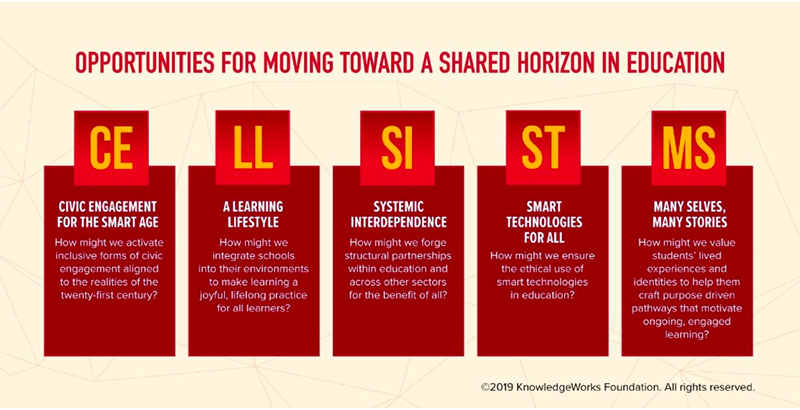Prince: In a Rapidly Changing Educational Landscape, We Must Plan Now to Create a More Equitable Future of Learning. Here are 5 Areas to Consider

The next decade will bring major disruptions to how we organize society, relate to one another and conduct our daily lives. The continuing expansion and integration of digital technologies will force education systems — and society at large — to confront new ways of connecting, thinking, working and learning.
This changing landscape makes it urgent that education leaders at the school, district, community and state levels grapple with emerging issues and take action today to create an equitable future of learning. Unless education stakeholders face the future head-on and identify compelling strategies for navigating it, providing learners with access to all the resources and opportunities they need to discover and reach their full potential will not be possible. If left unchecked, today’s narratives and metrics of achievement will continue to undermine individual and societal health and increase the toxicity of many systems and institutions.
A recent strategy guide published by KnowledgeWorks offers five key opportunities for embarking on the complicated and often daunting task of reorienting education systems toward future needs while pursuing equity and broadening the range of learning pathways available to students.

These opportunities can inform strategy at the school, district, community and state levels. When coupled with a shared vision articulating future aspirations, they can help ensure that efforts to adapt or transform education systems position learners and organizations for future success.
● Civic Engagement for the Smart Age — Emphasizes the opportunity for education institutions to help learners participate effectively in an increasingly strained democracy. Helping learners of all ages and backgrounds use their voices and express their visions for the future promises to revitalize a proactive citizenry and shape a society that better reflects everyone’s aspirations.
● A Learning Lifestyle — Highlights the potential to embed learning in communities in ways that enable students to experience an array of opportunities and discover the joys of lifelong learning. Bridging traditional school and community contexts can extend the range of resources and supports available to learners while enriching students’ experiences and laying a foundation for future success.
● Systemic Interdependence — Invites schools, districts and other education organizations to strengthen the webs of support available to learners — as well as their own organizational resilience — by thinking anew about partnerships. Exchanging expertise across traditional boundaries such as public and private, or education and other sectors, can help leaders identify new solutions to pressing problems and bring community stakeholders together around the common goal of helping young people thrive.
● Smart Technologies for All — Surfaces the urgent need to increase understanding of the ways in which technologies such as artificial intelligence and neuro-enhancement tools can enable new approaches to learning — or exacerbate inequity. Helping learners and other community members develop digital literacy, convening broad coalitions to establish ethical frameworks for the use of smart technologies in education and partnering with technology companies can help education leaders realize potential benefits while mitigating risk.
● Many Selves, Many Stories — Explores how helping students connect their experiences and identities with their learning can foster authentic engagement and improve outcomes. Expanding curricula, assessments and narratives of success can help learners develop the voice and agency to create and successfully pursue purpose-driven learning pathways, and ultimately steer the courses of their lives.
To position all learners for success in our rapidly changing world, education systems and institutions need to transform, becoming more adaptive, flexible and responsive. Today’s decisions and innovations can address the immediate needs of learners and institutions while building capacity for the future. If education leaders do not take informed, future-oriented action today, they risk widening the equity gap.
The future is not waiting for us. We cannot afford to wait for it, either.
Katherine Prince leads KnowledgeWorks’ exploration of the future of learning. As vice president, strategic foresight, she speaks and writes about the trends shaping education over the next decade and helps stakeholders strategize about how to become active agents of change in shaping the future. Twitter: @katprince #NavigateFutureEd #FutureEd
Get stories like these delivered straight to your inbox. Sign up for The 74 Newsletter

;)